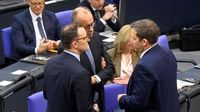On May 6, 2025, the German Bundestag witnessed a historic and tumultuous event as Friedrich Merz, the leader of the CDU, failed to secure the necessary majority in the first round of voting for Chancellor. With 310 votes in favor, he fell short of the required 316 votes, a setback that has left the political landscape in Germany uncertain.
The day began with high expectations. The Bundestag convened at 9:00 AM, with the election of the Chancellor as the first item on the agenda. President Frank-Walter Steinmeier had proposed Merz as the candidate, setting the stage for what many believed would be a straightforward election. However, the reality proved to be far more complex.
As the voting unfolded, each member of parliament was called by name to cast their vote in secret. This process, while designed to ensure confidentiality, also allowed for potential dissent without public accountability. Despite assurances from SPD chief Lars Klingbeil that there would be no defectors from his party, the results revealed a different story. The SPD, CDU, and CSU coalition, which collectively held 328 seats, could not muster the necessary support for Merz.
Markus Söder, the leader of the CSU, expressed disappointment over the results, stating, "We need stability more than ever and could not achieve it today." He emphasized the importance of not assigning blame but rather focusing on the responsibility of ensuring a functioning government. The sentiment echoed throughout the chamber, with many leaders urging calm and unity in the face of the unexpected outcome.
Political analysts and party leaders alike were quick to comment on the implications of Merz's failure. Karl-Rudolf Korte, a political scientist, suggested that the possibility of a Kenya coalition—a coalition involving the CDU, SPD, and the Greens—remained feasible, despite the unusual nature of such a partnership. He remarked, "We don't need to declare a state of emergency or fear that the AfD will take over. There are other majorities to be found in the middle." This perspective reflects a broader concern about the fragmentation of political alliances in Germany.
Following the vote, the atmosphere in the Bundestag was tense. The session was interrupted as members of the Union and SPD retreated to discuss the next steps. Many expressed disbelief and frustration over the failure to elect Merz. SPD MP Serdar Yüksel described the mood as one of "dismay and incomprehension," indicating that the fallout from this vote would likely lead to significant internal party discussions.
As the dust settled, speculation about a second voting round began to circulate. CDU General Secretary Carsten Linnemann confirmed that discussions were ongoing regarding the timing of another election, possibly as early as Wednesday, May 7, 2025. However, the legalities surrounding the process meant that any second round would require careful negotiation among the parties involved.
In the wake of Merz’s defeat, political leaders from various parties weighed in on the situation. Linken leader Jan van Aken expressed concern that AfD members might support Merz in a potential second round, complicating the dynamics further. Meanwhile, Alice Weidel of the AfD celebrated the outcome, calling it a "good day" and suggesting that it highlighted the instability of the proposed coalition.
Amidst the political turmoil, the implications for governance in Germany are significant. Olaf Scholz, the outgoing Chancellor, will continue to lead the country until a successor is appointed, as stipulated by Article 69 of the German Constitution. This provision mandates that the current Chancellor remains in office until a new Chancellor is officially named, ensuring continuity in governance even during periods of uncertainty.
The failure to elect Merz marks a significant moment in German politics, as it is unprecedented for a designated Chancellor to fall short of a majority in the first round following successful coalition negotiations. This event raises questions about the future stability of the government and the ability of political parties to unite in addressing the pressing issues facing Germany.
As the day progressed, the political ramifications of the failed election continued to unfold. Members of the Bundestag reflected on the implications of their votes, with many acknowledging the gravity of the situation. The need for a stable government is more critical than ever, as Germany faces a range of challenges, from economic uncertainty to international relations.
In conclusion, Friedrich Merz's failure to secure the Chancellor position in the first round of voting has set the stage for a complex and potentially chaotic political landscape in Germany. As parties regroup and strategize for the next steps, the focus will be on finding a path forward that ensures effective governance and stability in a time of uncertainty.





